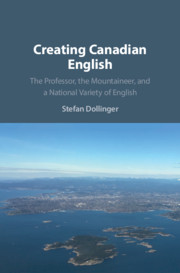Book contents
- Creating Canadian English
- Frontispiece
- Creating Canadian English
- Copyright page
- Dedication
- Contents
- Figures
- Tables
- Preface
- Acknowledgements
- A Note to the International Reader
- 1 What is Canadian English?
- 2 The Heritage of Canadian English
- 3 Avis Pulls It Off
- 4 The “Technology”: Slips, Slips, and More Slips
- 5 1967 – Excitement and Hype
- 6 Riding the Wave of Success
- 7 A Global Village and a National Dictionary War
- 8 Decolonizing DCHP-1 and DCHP-2
- 9 Is There Really a Canadian English?
- Notes
- Further Reading
- Bibliography
- General Index
6 - Riding the Wave of Success
Published online by Cambridge University Press: 24 June 2019
- Creating Canadian English
- Frontispiece
- Creating Canadian English
- Copyright page
- Dedication
- Contents
- Figures
- Tables
- Preface
- Acknowledgements
- A Note to the International Reader
- 1 What is Canadian English?
- 2 The Heritage of Canadian English
- 3 Avis Pulls It Off
- 4 The “Technology”: Slips, Slips, and More Slips
- 5 1967 – Excitement and Hype
- 6 Riding the Wave of Success
- 7 A Global Village and a National Dictionary War
- 8 Decolonizing DCHP-1 and DCHP-2
- 9 Is There Really a Canadian English?
- Notes
- Further Reading
- Bibliography
- General Index
Summary
The popularity of the Dictionary of Canadianisms happened as predicted in Canada's centennial year 1967, and, for a few years following, Gage Ltd's investment in the historical dictionary produced returns. However, rather than the promised revisions of the Dictionary of Canadianisms, a cheaper abridged version was produced in 1973, which ultimately failed to garner significant uptake. Other editions were either not produced or priced with discounts not large enough. Changes in focus in the wider field of linguistics, combined with the high price of the dictionary, combined to let the dictionary fall into relative oblivion just a decade after its much-celebrated publication. Douglas Leechman, one of the key contributors to the 1967 edition, moved on in 1968 to become the perhaps most important Canadian consultant for Robert Burchfield's Supplements to the Oxford English Dictionary, so he was unavailable for revising the Dictionary of Canadianisms. The Chomskyan and Labovian schools coming to the fore, the latter with its renewed focus on spoken non-standard language, helps explain the relatively sudden lack of attraction for academic linguists in the Canadian English dictionary work.
Keywords
- Type
- Chapter
- Information
- Creating Canadian EnglishThe Professor, the Mountaineer, and a National Variety of English, pp. 142 - 161Publisher: Cambridge University PressPrint publication year: 2019

